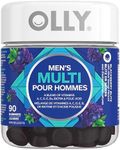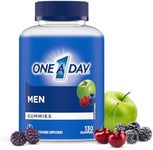Buying Guide for the Best Multivitamin For Men
Choosing the right multivitamin for men can feel overwhelming with so many options on the market. The key is to focus on your personal health needs, lifestyle, and any specific gaps in your diet. Multivitamins are designed to supplement your nutrition, not replace a balanced diet, so it's important to look for a product that complements your daily habits and addresses your unique requirements. Understanding the main ingredients and their roles can help you make an informed decision that supports your overall well-being.Vitamin and Mineral ContentThis refers to the types and amounts of vitamins and minerals included in the multivitamin. It's important because different nutrients support different aspects of health, such as energy, immunity, and bone strength. Some multivitamins offer a basic range of essential nutrients, while others include higher doses or additional ingredients. If you have a balanced diet, a standard multivitamin may be enough, but if you have specific deficiencies or dietary restrictions, you might need a formula with higher or targeted amounts of certain nutrients. Always check the label to ensure it matches your needs.
Formulation for MenMen's multivitamins are often tailored with nutrients that support male health, such as higher levels of certain B vitamins, magnesium, or zinc, and sometimes ingredients for prostate health. This is important because men have different nutritional needs than women, especially as they age. If you are looking for general support, a standard men's formula is suitable, but if you have specific health concerns, look for a product that addresses those areas.
Dosage and Serving SizeThis indicates how much of each nutrient you get per serving and how many pills or capsules you need to take daily. It's important because taking too much or too little can affect your health. Some multivitamins require multiple pills per day to deliver a full range of nutrients, while others are once-daily. If you prefer convenience, a once-daily option may be best, but if you want higher doses or a broader spectrum, you might need to take more. Consider your routine and what you are comfortable with.
Additional IngredientsSome multivitamins include extras like herbs, antioxidants, or amino acids. These can offer added benefits, such as supporting energy, immunity, or stress management. However, not everyone needs these extras, and some may interact with medications or health conditions. If you want a simple supplement, stick to basic vitamins and minerals. If you are interested in specific health benefits, look for formulas with added ingredients that match your goals, but always check for potential interactions.
Absorption and BioavailabilityThis refers to how well your body can absorb and use the nutrients in the multivitamin. Some forms of vitamins and minerals are easier for the body to use than others. For example, certain types of magnesium or B12 are more bioavailable. If you have digestive issues or want to maximize benefits, look for products that mention high bioavailability or use well-absorbed forms of nutrients. Otherwise, a standard formulation is usually sufficient for most people.
Allergen and Additive InformationThis covers whether the multivitamin contains common allergens like gluten, dairy, or soy, as well as artificial colors, flavors, or preservatives. This is important if you have allergies, sensitivities, or prefer a cleaner product. If you have specific dietary needs or want to avoid certain ingredients, check the label for allergen statements and look for products labeled as free from those substances.
















